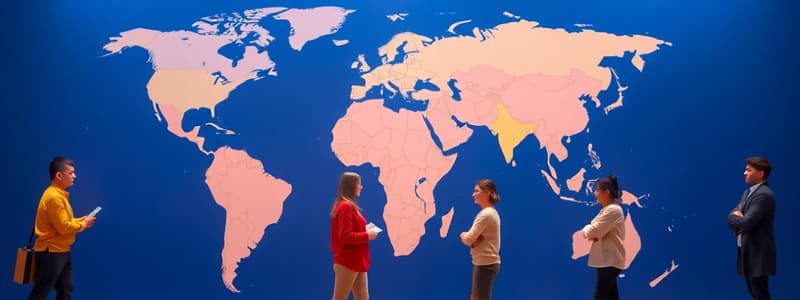Podcast
Questions and Answers
What is the primary purpose of environmental scanning in a business context?
What is the primary purpose of environmental scanning in a business context?
- To identify internal weaknesses and strengths
- To establish a company's long-term financial goals
- To analyze past performance for future forecasts
- To survey and interpret relevant data for external opportunities and threats (correct)
Which component is NOT part of the environmental scanning process?
Which component is NOT part of the environmental scanning process?
- Competition
- Trends
- Regulatory compliance (correct)
- Labour supply
What does Hofstede’s cultural dimension of power distance refer to?
What does Hofstede’s cultural dimension of power distance refer to?
- The extent to which less powerful members expect and accept unequal power distribution (correct)
- The value placed on competitiveness versus collaboration
- The preference for immediate versus delayed gratification
- The degree of discomfort individuals feel in uncertain situations
Which of the following best describes the impact of globalization?
Which of the following best describes the impact of globalization?
Which context shapes the political-legal environment for businesses?
Which context shapes the political-legal environment for businesses?
Which strategy involves offering superior quality to maintain a competitive advantage?
Which strategy involves offering superior quality to maintain a competitive advantage?
What is one characteristic of an unfavourable competitive environment?
What is one characteristic of an unfavourable competitive environment?
Which of the following is NOT a factor that shapes the competitive environment?
Which of the following is NOT a factor that shapes the competitive environment?
How does culture influence international business practices?
How does culture influence international business practices?
Which of the following strategies focuses on targeting a specific market segment?
Which of the following strategies focuses on targeting a specific market segment?
Flashcards
Global Business Environment
Global Business Environment
All external factors affecting a business, outside its control, but still impactful on performance.
Environmental Scanning
Environmental Scanning
Analyzing external factors (trends, competition, tech, customers, labor) to spot opportunities and threats.
Globalization
Globalization
Increased interaction and connections globally between people, groups, and businesses.
Hofstede's Cultural Dimensions
Hofstede's Cultural Dimensions
Signup and view all the flashcards
Global Macro Environment Influences
Global Macro Environment Influences
Signup and view all the flashcards
Competitive Rivalry
Competitive Rivalry
Signup and view all the flashcards
Buyer Power
Buyer Power
Signup and view all the flashcards
Threat of Substitutes
Threat of Substitutes
Signup and view all the flashcards
Supplier Power
Supplier Power
Signup and view all the flashcards
Focus Strategy
Focus Strategy
Signup and view all the flashcards
Study Notes
Chapter Three: Global Business Environment
- Global business environment encompasses all factors outside a company's control that can influence its performance. These factors aren't excuses for poor performance, but they should be considered proactively.
- Environmental scanning helps identify and analyze opportunities and threats influencing future decisions. Components include trends, competition, technology, customer preferences, and the availability of labor.
- Globalization increases interaction and connections between individuals, groups, and organizations worldwide.
Defining and Explaining Globalization's Impact
- BRICS and the European Union are significant global players.
- Hofstede's Cultural Dimensions describe cultural variations in power distance, masculinity/femininity, uncertainty avoidance, and long-term/short-term orientation. Individualism vs. collectivism and indulgence vs. restraint dimensions are also often present.
Global Macro Environment Influences
- Political-legal context originates from national and international governmental policies and types of governance.
- Economic context includes economic cycles (recessions/booms), and trade policies.
- Technological context continually introduces new products, services, production, and communication methods.
- Social-ethical context involves social trends, values, and corporate social responsibility, along with ethics.
Global Competitive Environment
- Organizations face competition from several sources, including new entrants, existing competitors, substitute products, and powerful suppliers or buyers.
- Cost leadership strategy focuses on low-cost production and pricing.
- Differentiation strategy focuses on uniqueness or higher quality.
- Focus strategy targets specific market segments with specialized products.
Role of Culture in International Business
- Culture influences how people conduct business in various countries.
- Cultural differences affect management practices and approaches. Differences in values and norms can impact how businesses interact.
- Unfavorable competitive environments often have high growth industries with few competitors, high barriers to entry, and limited substitutes. Organizations also need to consider the relative power of suppliers and customers.
Studying That Suits You
Use AI to generate personalized quizzes and flashcards to suit your learning preferences.




